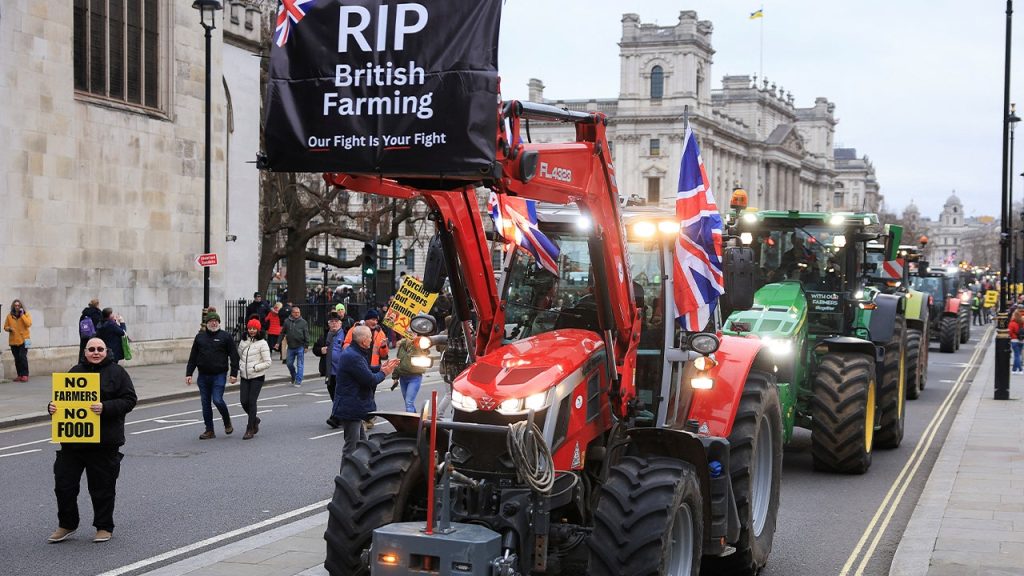The recent protests by British farmers, culminating in the blockade of central London streets with hundreds of tractors, underscore the deep-seated anxieties within the agricultural community regarding the government’s decision to eliminate the inheritance tax exemption for agricultural families. This policy, dubbed the “tractor tax” by its detractors, was implemented as a revenue-generating measure to address the financial strain on public services. However, farmers argue that it poses an existential threat to family farms, potentially leading to their fragmentation and a consequential decline in food production. The tractor blockade symbolizes the farmers’ resolve to resist this policy change, highlighting their concerns over the future of their livelihoods and the nation’s food security.
The farmers’ grievances extend beyond the inheritance tax issue, encompassing a broader discontent with the prevailing economic conditions affecting the agricultural sector. Years of pressure from competitive supermarket pricing practices, the influx of cheaper imported produce, and subsidy reductions following Brexit have eroded farm incomes, leaving many farmers struggling to maintain profitability. The removal of the inheritance tax exemption is perceived as the final blow, jeopardizing the traditional intergenerational transfer of farms and undermining the long-term viability of family-run agricultural businesses, which form the backbone of British agriculture.
The government’s rationale for introducing the “tractor tax” is rooted in the need to bolster public finances and address the growing demands on public services. However, farmers contend that the long-term consequences of this policy far outweigh any short-term financial gains. They argue that the fragmentation of family farms, driven by the inheritance tax burden, will lead to a decrease in domestic food production, increased reliance on imports, and a loss of valuable agricultural expertise passed down through generations. This, they warn, could have serious implications for the nation’s food security and the resilience of its agricultural sector.
The protests, including the tractor blockade in London and earlier demonstrations across the country, represent a concerted effort by farmers to pressure the government into reconsidering its stance on the inheritance tax. They seek to demonstrate the widespread opposition to this policy within the farming community and highlight the potential economic and social ramifications of its implementation. The participation of high-profile figures like Jeremy Clarkson, the former Top Gear presenter whose popular Amazon Prime show “Clarkson’s Farm” offers insights into the realities of modern farming, further amplifies the farmers’ message and brings their concerns to a wider audience.
Despite the escalating protests and the impassioned pleas from farmers, the government has remained steadfast in its commitment to the new inheritance tax policy. Environment minister Steve Reed has acknowledged the challenges facing the agricultural sector and emphasized the government’s efforts to support farmers through various rural support schemes. However, these assurances have failed to allay the anxieties of farmers who view the inheritance tax as a direct threat to their livelihoods. The government’s unwavering stance sets the stage for a prolonged confrontation with the farming community, with the potential for further protests and disruptive actions if a compromise is not reached.
The new inheritance tax rules, set to take effect in 2026, will impose a 20% tax on the value of a farm exceeding £1 million. While existing personal allowances, which can be combined for married couples, effectively raise the threshold for a farm and associated property to £3 million, many farmers argue that this threshold is still too low and fails to adequately account for the true value of agricultural land and assets. The fear is that the tax burden will force many families to sell off portions of their land or even their entire farms to meet the tax liability, leading to the fragmentation of agricultural holdings and the erosion of the family farm structure that has long characterized British agriculture. The ongoing protests reflect a deep-seated concern about the future of farming in the UK and the potential long-term consequences of this policy change.










